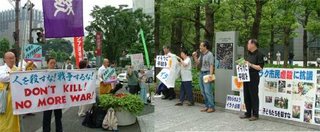Japan pulling out of "Iraq Inc."

Last night as I was trying to listen to a BBC5 live webcast from the Sweden-England game (the webcast sadly stopped just before the game, for copyright reasons), I heard an interesting interview with author Pratap Chatterjee, who has written the book Iraq Inc.: A Profitable Occupation. In the BBC interview, he was extremely critical of the huge profits that go to private companies such as Bechtel, presumably to "rebuild" Iraq. Nothing of the sort is happening, according the BBC interview.
It seems few hospitals or schools have been completed, and the Iraqis have worse water and sewage systems than before 2003. He described how subcontractors go out and take photos to prove that a certain project is finished, while much work in fact remains. But the western executives are too lazy or scared to go out and check for themselves.
This, of course, is relevant as Japan's Prime Minister Junichiro Koizumi has just announced that Japan's Self-Defence Forces will pull out of Iraq. Amazingly, no Japanese journalists or authors have asked what the troops have been doing there. The official line, of course, is that they have provided "humanitarian aid and helped rebuilding Iraq" but where is the evidence? It would be interesting to read at least one serious analysis of the results to ordinary Iraqi citizens from the SDF deployment.
For example, this is what The Yomiuri, has to say today, in an article titled GSDF contribution hailed :
As of June 13, the GSDF troops had dispensed medical aid 267 times, provided 54,000 tons of clean water, and improved medical facilities, water-supply facilities and school buildings in 113 locations. The GSDF personnel have employed about 400 to 1,000 locals daily, for a total of 475,000 worker days, and received words of gratitude from local communities.
In Iraq, guerrilla action sometimes kills members of the occupying U.S. and other multinational forces. The Japanese troops have conducted their mission without any loss of life, partly because the units built friendly ties with locals in Samawah.
However, Samawah is in one of the most stable and safe parts of the country. In addition, many residents were friendly partly because the city's general hospital was constructed with Japanese official development assistance.
Japan's vocal peace groups have been very critical of the Japanese SDF deployment in Iraq. For more information, please see the following pages from 2003, 2004, 2005, and 2006.
Update: Asahi has the story about what Japanese NGOs like the Association of Medical Doctors of Asia International and the Japan International Volunteer Center think Japan should do now. Perhaps we are seeing the beginning of a debate here.
(Photo from Peace-Forum)

Comments